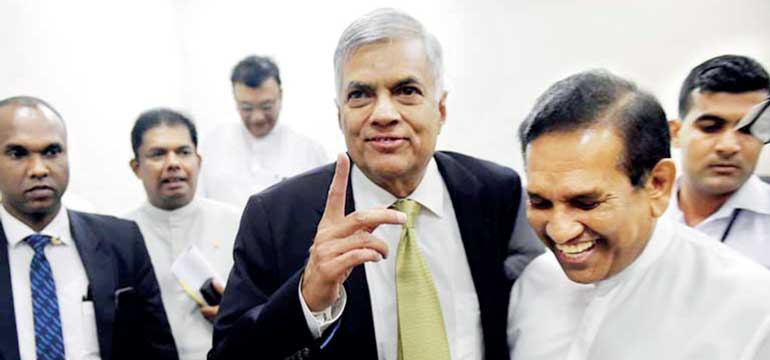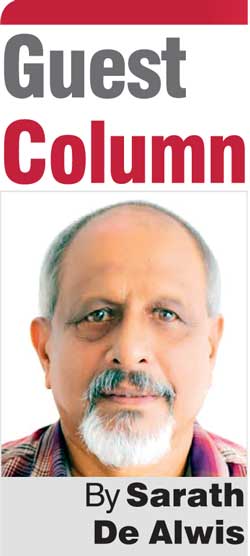Sunday Feb 22, 2026
Sunday Feb 22, 2026
Monday, 9 April 2018 00:00 - - {{hitsCtrl.values.hits}}

A huge banner on the perimeter fence at Sirikotha, the United National Party (UNP) headquarters, gloats ‘Maha Balayak Ekama Ratak ‘ – A colossal force – One country. Hannah Arndt comes to my mind: “Truthfulness has never been counted among the political virtues and lies have always been regarded as justifiable tools in political dealings.” Ranil did not win. He got a reprieve.
In the temple of democracy
On Wednesday, in the temple of democracy, fiction eclipsed fact. Truth turned tentative. Ethical norms turned elastic.
In a manner of speaking, the debate on the no-confidence motion, which President Sirisena claims he did not either suggest or promote was profitable, productive, informative and instructive.
We discovered something about our vitiated democracy. The delegated will of the people is not an abstract concept. It is a tangible, tradable commodity. If our delegated will is entrusted to gentleman such as Dilan Perera or S.B. Dissanayake you can bet your bottom dollar, rupee or paisa that they will parlay it for good ministerial office irrespective of them being for, against or neutral on Ranil.
If one adheres to etymological purity, ‘bullshit’ means the defecated product of a bull. Princeton Professor of Political Science Harry Brandenburg informs us that bullshitting is a recognised form of political communication.

Art of political communication – Bullshit
The English Oxford Dictionary defines bullshit as a noun and slang for stupid or untrue talk. As a verb, bullshitting implies uttering nonsense.
There is a distinct advantage in using the term bullshit. It is precise. It differentiates between lying and politicking.
Politicians don’t lie. They stretch the truth. The liar violates the law. The bullshitter does not violate the law. On the contrary, bullshitters claim to be upholders of the law.
Politicians rely on bullshitting when the truth is inconvenient. It is the better option to lying.
So that is what they did last Wednesday. They engaged in political communication and unloaded container-loads of bullshit.
There are lessons to be learnt from the debate and the final vote count on Wednesday, 4 April. There were three responses during the count. Pakshai, virudhai and absent. The word absent is now in the Sinhala vocabulary.
Staying away is now a form of political statement. It is more than that. It is subterfuge and deceit at its most eloquent.
We are to be blamed. We don’t understand our political class. Our problem is our inability to understand how politicians see the road ahead. They don’t use a rearview mirror. They don’t need to watch where they are headed to. They don’t remember where they have been.
If the reader understands this bit of convoluted wisdom, he or she would have no problem in deciphering the expositions of Susil Premjayantha and S.B. Dissanayake, the two outstanding trapeze artists of last Wednesday’s circus.
The point is to change the system
Philosophers have interpreted the world in various ways said Karl Marx. “The point was to change it.” Venerable Maduluwawe Sobhitha thero was someone who attempted such change. He was a barefoot prophet. He relied on two emissaries - Maithripala Sirisena and Ranil Wickremesinghe.
The two were not ready to wade in barefoot. Maithri has put on Sinhala nationalist Ranaviru boots. Ranil has opted for neoliberal ‘Hush Puppies’. Give the devil his due. Mahinda is barefoot and walks in the opposite direction.
Yahapalanaya was a movement. Over its three years, it turned into a business. We have 18 months remaining to make it a movement again. Failure to make it a movement will make it a swindle in history.
The real and moral
Politicians are realists and not moralists. To us ordinary, little people, conscience is what keeps us awake at night. Not so if you are on the business of politics. Politicians sleep well. They all slept well on Wednesday night.
Conscience, as the German thinker Nietzsche said, is a fake adornment used by little people trying to come to terms with superior people in their midst. It is those superior people who practise the craft of politics.
Ranil will be committing a grave error if he considers Wednesday’s vote a win. It was at best an engineered survival. If he is elated by the noise of the crackers paid for by the party, his elation will be at his own peril.
Cronyism is a phenomenon that is as old as the discipline of modern economics. Adam Smith, the intellectual founder of modern free-market economics, famously called the economic system he advocated “the obvious and simple system of natural liberty.”
What he called natural liberty was applicable especially to the non-elite who are represented by the Range Bandaras.
Robust economic growth offered the only way out and the means of creating opportunities for the less advantaged members of society. The trick is to convince them by speaking their language. Ranil has 18 months left to find people who speak with coherence the language that they understand.
A reprieve, not a win
It is a reprieve and not a victory for Prime Minster Ranil Wickremesinghe. The rainbow collation of 8 January 2015 is not dead but in a state of hibernation. It can be resuscitated by credible leadership. At present, that excludes any leading light in the current firmament.
No Tamil or Muslim parliamentarian voted for the no-confidence motion. The minorities do not want a return of the Rajapaksa tribe.
Should the SLFP follow this duplicitous path, it will not merely end up divided, it will lose its coherence and relevance as a political party ceding more ground to the rival of the ‘Pohottuwa’. Wednesday’s vote has a clear message for both parties. In the absence of a genuine will on the part of both sides, and a failure to restore a working relationship to the national government, there will be a circus populated by clowns. The people will not be amused. Popular outrage can be surprisingly spontaneous.
The convoluted logic of the president in not noticing the incongruence of SLFPers who voted for the motion opting to remain in the Cabinet headed by the Prime Minister and presided over by him - the president is a subject that we must discuss on another day at another time.
The defeat of the no-confidence motion is not a win for either Wickremesinghe or his party. It is only a reprieve and not a final resolution of its internal crisis.
The ousted tyranny lurks close, breathing down our necks, hurting memory, tormenting emotion and spoiling our mood.
Lessons of Dunkirk
If Ranil is prudent and prescient, he will regard his parliamentary survival on Wednesday night as his Dunkirk moment. By doing so, he will be able to trace a Churchillian path towards the abolition of the executive presidency, honest to goodness power devolution and purposeful national reconciliation.
Dunkirk was the unplanned turning point that allowed Britain to recover from its humiliating defeat and withdrawal in the face of Hitler’s advancing army. Dunkirk represents both the abyss of despair and a fountain of hope and courage.
British troops trapped between the Nazi juggernaut and the channel were saved in a massive evacuation by sheer grit and enormous luck.
The success of the evacuation was a morale booster. It allowed a beleaguered Britain time and space to recover and finally defeat Nazi tyranny.
What happened in Parliament on Wednesday night was such an evacuation of troops. In case they notice, it helped identify enemy infiltrators.
Blunders and miscalculations
Novelist J.B. Priestley was a BBC reporter on the beaches of Dunkirk. He said: “What began as a miserable blunder, a catalogue of misfortunes and miscalculations, ended as an epic of gallantry.” A fitting summary of the past three years of Yahapalanaya!
On Wednesday night our miserable blunders, miscalculations and misfortunes ended when the good sense of the UNP rebels prevailed over their anger and disillusionment. Their gallantry of purpose overcame their reticence over their leader’s shortcomings.
The promoters of the motion knew that SLFP defectors alone could not do the trick. UNP dissidents were a vital component of the equation.
Evident, seeming and obvious
The motion of no confidence was evidently aimed at the Prime Minister. It was seemingly condemnatory of the bond scam. It was obviously intended to change the composition of the Government.
The grand hoopla created by its architects, sponsors and wannabe legatees is irrefutable proof of Mahinda’s mastery over popular imagination.
Mahinda Rajapaksa, having won the war, proceeded to remodel our socioeconomic and political structures. He converted impersonal institutions that trace their origins to the time when universal franchise was introduced into extractive agencies managed as personal fiefdoms. Kinship and friendship determined political allegiance.
The Yahapalanaya successors found the proposition too seductive to dismantle. They foolishly attempted to replace existing kinships and friendships with their own.
Remaining 18 months
In the remaining 18 months, the Government cannot do what it failed to do in the past three years. That said, it can by exploiting this Dunkirk moment, outwit the tyrant by opening a second front in the form of credible investigations and prosecutions of crimes that the Rajapaksa regime committed.
These are crimes that everybody talks about and nobody seems anxious to do anything about. Lasanatha, Prageeth, Thajudeen. Yet, in the last two weeks, there are signs of movement in these emblematic cases of Rajapaksa excesses and brutality. A sudden spate of arrests and refusal by courts to grant immunity from arrest in the case of high officials now under criminal investigation for abduction and murder indicates a turning point.
A Cabinet not exceeding 30, that excludes national list members who cannot claim exceptional and demonstrated competence and achievements, would help restore credibility to a Government that is perceived as rudderless.
Only decisive action and demonstrated political will in the next 18 months will reawaken the reformist constituency of 8 January 2015.